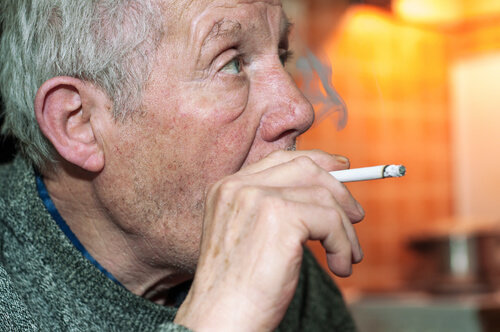
Smoking for many people, particularly people aged 65+, is a habit of a lifetime and it can be very difficult for anyone. So how can the elderly stop smoking?
If you are an older person who smokes, you may not wish to give in to the requests of family, friends or your GP, when they ask you to stop smoking. Older smokers may argue they should not have to give up one of their life’s ‘guilty pleasures’.
Why should I quit smoking?
There are a number of reasons why quitting smoking is a good idea.
Here are some reasons to quit smoking:
Smoking damages your health. Each time you smoke a cigarette, your body is exposed to thousands of chemicals, many of which are poisonous. As soon as you stop smoking, your body begins to rid itself of all the poisonous toxins caused by smoking.
If you quit smoking you will, within days or weeks:
- Feel better.
- Have more energy.
- Save money.
- Look better. More oxygen will get to your skin and make it brighter. Have better-looking teeth because they won’t be stained with tar caused by smoking.
- Breathe more easily. Better lung function leads to less coughing, wheezing and breathing issues.
- Have improved blood circulation to the heart and muscles. This will make physical activities easier.
- Have an improved sense of taste and smell.
- Recover more quickly from an infection or operation.
- Reduce your risk of heart disease, cancer, lung issues, stroke, type 2 diabetes, bone disease including osteoporosis, eye disease and dementia.
- Live longer.
- Protect the health of others around you. This is because they are no longer breathing in second-hand smoke known as ‘passive smoking.’
Debunking smoking myths
‘What harm can smoking do to me now at my age?’
The simple answer to this is… lots.
You will still experience all the same negative effects of smoking as an older person that a younger person can experience. Smoking will still zap your energy and your wallet.
- An older people may need care and support, but smoking makes recovery from an operation or infection more difficult. It can make your attempts at any physical activity, however gentle, more difficult.
- Smoking also increases your risk of heart disease, cancer, stroke, type 2 diabetes, breathing and other lung problems, dementia and bone disease including osteoporosis.
‘I’m too old to quit’
Heard about the woman who regretted never having the chance to study as a young girl and began hitting the books at the age of 70 and was later rewarded with a degree? Or the woman who learned to swim at the age of 80? Our bodies and minds are capable of many things and much more than we give them credit for.
In particular, it is never too late to quit smoking because quitting will improve your health whatever age you are and no matter how long you have smoked.
Stoptober is a campaign to encourage smokers to quit smoking on 1 October and keep it up for at least 28 days, with the aim of stopping smoking permanently. Research reveals, if you stop smoking for 28 days, you are 5 times more likely to stop for good.
According to Public Health England, ‘Older smokers are still more likely to sustain their quit attempts vs younger smokers.’
‘Smoking makes me relaxed and happy’.
Many smokers say smoking helps them feel less anxious and they deal with stress better but smoking is actually harming mental health and wellbeing. At the withdrawal stage of quitting, research has revealed, people have less anxiety, depression and stress. Others who quit, report feeling more positive.
Rather than risking your health to feel relaxed why not find something else that can help you feel good. For example:
- Read a book
- Pursue other hobbies and interests.
- A daily walk outdoors to immerse yourself in nature, breath in the fresh air, appreciate the changing landscape, listen to the birds.
- Try dancing or singing. This could be alone or in a group.
- Listen to your favourite music.
‘Quitting smoking is impossible. I tried before and it didn’t work’
Before quitting, spend longer planning and thinking about what really worked for you last time and what made you lapse. Even if you’ve tried to quit smoking several times before, you can still achieve what seems to be impossible, with the right support.
Top 10 tips to help you quit smoking
1. Have a support network
This could be a close friend or family member or an ex-smoker. Most importantly keep in regular contact with the NHS Stop Smoking Service to stay motivated and informed of the aids such as NRTs you need to help you quit smoking.
2. Set a date to quit smoking
It is a good idea to have a date set to focus on and plan for.
3. Remove any reminders
Before the date intended to quit smoking, get rid of ashtrays, lighters, matches and cigarettes.
4. Make use of quit smoking aids such as NRTs to tackle cravings
To help you cope with your cravings for a cigarette, make use of Nicotine Replacement Therapies (NRTs). This will help with withdrawal symptoms.
5. Change your smoking routines to avoid triggers
To quit smoking you may have to get rid of your smoking routine. For example: finding something else to do during your usual cigarette break times such as going for a walk. If going into your local newsagents triggers an urge for you to buy a cigarette, avoid going there.
Be aware that you won’t be able to avoid all triggers. If you routinely smoke when stressed, try coping in another way such as talking to a friend face to face, via a phone call or text.
6. Exercise
Research reveals that even short periods of physical activity, especially aerobic exercise, reduce the urge to smoke. Withdrawal symptoms and cravings for cigarettes decrease during exercise and up to 50 minutes after exercising. Walking, swimming, running, dancing, cycling are examples of aerobic exercise.
7. Take slow, deep breaths.
If you have a craving, try deep breathing through it. Inhale through your nose and exhale through your mouth. Repeat this 10 times or until you feel more relaxed. Mindfulness helps people cope with cravings and stress. Be fully aware of the present moment – your emotions and physical feelings, what you see, hear, touch, and smell around you.
8. Do something for someone else
Try distracting yourself by being helpful to a friend or family member. This takes the focus off yourself and instead allows you to think of another person’s needs.
9. Reward yourself
Quitting is extremely difficult because it is an addiction. Acknowledge you’re doing something hard. Reward yourself with treats with the money you have saved from not buying cigarettes or tobacco.
10. Don’t give up
Do whatever it takes to beat the urge to smoke. Keep trying different things until something helps and never give up.
‘I smoked between 10-12 cigarettes a day’
Sixty-six-year-old retired chef Allan Berry had been smoking for 40 years until he quit and is now urging older people to get help to quit smoking for good.
Mr Berry was admitted to the Trust’s Royal Liverpool University Hospital in May 2021 for vascular surgery. As a hospital inpatient, he received support from the CURE team at Liverpool University Hospitals NHS Foundation Trust who gave him a quit smoking plan and treatments
“It wasn’t until I was in my 20s that I took up smoking, and until this year I smoked between 10 and 12 cigarettes a day” says Allan Berry.
“When I was going out, the pubs were all filled with clouds of smoke.
“I’d play darts and snooker with my friends, who all smoked, and my parents did too – no-one batted an eyelid, it was just the normal thing to do.”
It wasn’t until Allan’s health started to deteriorate, that he tried to kick the habit.
Allan has several health conditions caused by smoking, including peripheral arterial disease, where fatty deposits in the arteries restrict blood supply to the leg muscles, and Chronic Obstructive Pulmonary Disease (COPD), which causes breathing difficulties.
He has also suffered a heart attack and a stroke.
“Around 10 years ago, I’d managed about three days of no smoking, but in the end my wife Jan had to go and get me a packet of cigarettes as I was going mad.”
As a hospital inpatient, Allan was on the vascular ward and called it “a real wake up call”. “I saw some patients who were having their legs amputated because of the damage smoking had caused.”
Ian McNally works in the hospital’s CURE Team, which identifies smokers in hospital and supports them to start Nicotine Replacement Therapy (NRT), to alleviate cravings. Ian McNally said: “By medicalising nicotine addiction, it helps to reduce stigma and effectively support people to quit for good.”
Allan said: “I don’t get out of breath anymore. But don’t get me wrong, it’s incredibly difficult. I still don’t know what to do with my hands sometimes, after 40 years of smoking it’s hard. I’m not 100% there yet – but I’m 90% and I am so much better for it.”
What help is available to help me stop smoking?
When you quit smoking, your body adjusts to not having nicotine. In the first few days or weeks, you may, as a result, have cravings, problems sleeping or feel more hungry than usual and you may feel irritable.
Nicotine Replacement Therapies (NRTs)
Nicotine Replacement Therapy (NRT) works by replacing some of the addictive substance nicotine present in cigarettes and tobacco, so that smokers don’t feel so uncomfortable after quitting.
NRTs have nicotine but not the toxic chemicals that come from tobacco smoke. They reduce a person’s withdrawal symptoms that arise when they are trying to quit smoking. They can tackle a person’s craving for cigarette/tobacco smoke.
NRTs can be bought in supermarkets, pharmacies and shops. Your GP can also prescribe them. When you feel ready to do so, you can reduce your dose and gradually stop.
Types of NRTS
- Nicotine Patches
A nicotine patch releases nicotine slowly into the body’s system, through your skin. You can wear a 24-hour patch all the time, to help with nicotine cravings when you wake up, or a 16-hour patch when you are awake.
Heavy smokers should use a higher strength of patch and gradually reduce the dose and those who are not, can begin using a lower strength patch.
- Nicotine nasal spray
This nasal spray can reduce withdrawal symptoms quickly by helping you handle your immediate nicotine cravings. It does this by delivering nicotine through the lining of your nose and rapidly enters the bloodstream.
- Nicotine inhaler
Nicotine inhaler delivers nicotine through the lining of your mouth and throat.
- Nicotine mouth spray
A nicotine mouth spray delivers nicotine rapidly into the bloodstream through the lining of the mouth and throat.
- Nicotine gum
Nicotine gum deals with immediate cravings and is available in different strengths.
Chewing the gum and have it inside your cheek delivers nicotine quickly through the lining of your mouth and throat.
- Nicotine microtabs
Nicotine microtabs are tablets that dissolve fast under your tongue to deliver nicotine through the lining of your mouth and throat.
- Nicotine lozenges
Suck on a lozenge inside your mouth and have it inside your cheek to deliver nicotine through the lining of your mouth and throat. It is available in different strengths.
Other quit smoking aids
- Nicotine vapes
Vapes, also known as e-cigarettes, are electronic devices that let you inhale nicotine in a vapour instead of smoke. The vapes have different nicotine strengths and flavours. You can buy them at vape shops, pharmacies and supermarkets. They are not available on prescription from a doctor.
Using a vape daily with support from a stop smoking service can help people quit.
- Prescription-only medicine
This prescription-only medicine does not contain nicotine but can help with withdrawal symptoms. Ask your GP about them.
There are two NHS prescription-only medicines in tablet form.
- Varenicline (Champix brand).
- Bupropion (Zyban brand).
- The ‘Quit Smoking’ app
The NHS’s free ‘Quit Smoking’ app tracks your daily progress, offers support and even tells you how much money you’ve saved.
- Find a Stop Smoking service
Free expert support is available from your local NHS Stop Smoking service. Contact the service to speak to trained advisers who can motivate and encourage you.


